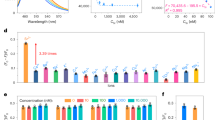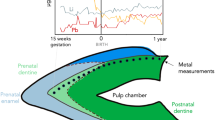Abstract
IT has been suggested that the radioactive content of deciduous teeth could be used as an index of the accumulation of various radionuclides in children1,2. Rosenthal et al. compared the concentrations of strontium-90 for teeth of children born in St. Louis between 1949 and 1957 with values obtained by Kulp et al.3 for bone. The concentration of strontium-90 in teeth was in accord with average bone values.
This is a preview of subscription content, access via your institution
Access options
Subscribe to this journal
Receive 51 print issues and online access
$199.00 per year
only $3.90 per issue
Buy this article
- Purchase on SpringerLink
- Instant access to the full article PDF.
USD 39.95
Prices may be subject to local taxes which are calculated during checkout
Similar content being viewed by others
References
Kalckar, H. M., Nature, 182, 283 (1958).
Rosenthal, H. L., Gilster, J. E., and Bird, J. T., Science, 140, 176 (1963).
Kulp, J. L., et al., Science, 132, 448 (1960).
Rep. UNSCEAR, Suppl. No. 16 (A/5216) (New York, 1962).
Radiological Health Data, IV (Nov. 1963); V (April 1964) (Public Health Service, U.S.A.).
Umweltradioaktivität und Strahlenbelastung (Gersbach and Sohn, Munich 1964).
Author information
Authors and Affiliations
Rights and permissions
About this article
Cite this article
SANTHOLZER, W., KNAIFL, J. Strontium-90 Content of Deciduous Human Teeth. Nature 212, 820 (1966). https://doi.org/10.1038/212820a0
Issue date:
DOI: https://doi.org/10.1038/212820a0



